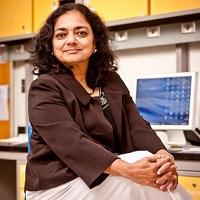Find schools
When you click on a sponsoring school or program advertised on our site, or fill out a form to request information from a sponsoring school, we may earn a commission. View our advertising disclosure for more details.
When you click on a sponsoring school or program advertised on our site, or fill out a form to request information from a sponsoring school, we may earn a commission. View our advertising disclosure for more details.

“We need to educate the public about proper use and securing of blockchain assets, cryptocurrencies, and related artifacts,” says Dr. Bina Ramamurthy, a professor in the computer science and engineering department at the University of Buffalo. Dr. Ramamurthy teaches a course in blockchain application development and acts as the director of the university’s Blockchain Thinklab. In May 2018, she launched a four-course specialization in blockchain technology in partnership with the University of Buffalo and Coursera.
“I was fascinated by Bitcoin as a digital currency around 2016,” Dr. Ramamurthy said. “I looked for a book or an explanation of how it worked and what was the magic behind this technology. I could not find any. Then in early 2017, after a long day at work, I found time to attend a local tech meetup, where they showed some videos explaining its operation. That was the a-ha moment for me. Since then, I have not stopped learning about blockchain, the technology driving Bitcoin.”
Bitcoin’s gotten most of the flashy headlines, but blockchain is the tech that’s doing the real work. Other networks and systems, like Ethereum, leverage the blockchain for more than simple monetary transactions. Ethereum’s coding introduces two revolutionary concepts: smart contracts and decentralized applications (dApps). Smart contracts are self-executing contracts that put ‘escrow’ in the hands of algorithmic code. Decentralized applications take this a step further by automating entire processes in an intelligent, secure, and ultimately more efficient manner.
“I anticipate most of the careers in blockchain will be in the application areas: as developers of blockchain decentralized applications,” Dr. Ramamurthy says.
Dr. Ramamurthy currently focuses her energy on Ethereum’s dApp ecosystem, where she sees a host of use cases: a dApp for education and skills credentialing of stateless refugees; an airline consortium dApp for seamless seat exchanges that will replace codesharing; a global marketplace dApp for farmers to sell their goods, both domestically and internationally, without an intermediary; and a decentralized registry and marketplace for art and collectibles.
“Blockchain has the potential to enable inclusive planetary-level trade, commerce, and access to resources,” Dr. Ramamurthy says. “I am excited that blockchain applications can cross political boundaries in allowing any unknown peer participant to get involved and interact on the blockchain.”
For those interested in a career with blockchain, Dr. Ramamurthy recommends starting with a computer science background, but says it’s not a must. Knowledge of data structures, algorithms, web programming (HTML/JavaScript), and programming in high level languages is more important than a computer science diploma. Adding in a blockchain specialization will give students a boost in the subject: the one hosted by the University of Buffalo and Coursera covers everything from the cryptographic underpinnings of blockchain to the personal development of smart contracts and dApps.
For further learning on the subject, the internet remains full of educational resources, soon to include Dr. Ramamurthy’s new book, Manning’s Blockchain in Action, which will be released in 2020.
Today, digital twins are not limited to just physical objects. With the rise of virtual and augmented reality technologies, digital twins can now replicate entire environments and systems in a virtual space. This has opened up new possibilities for testing and simulation, allowing companies to reduce costs and risks associated with physical prototypes.
Diversity and inclusivity aren’t purely idealistic goals. A growing body of research shows that greater diversity, particularly within executive teams, is closely correlated with greater profitability. Today’s businesses are highly incentivized to identify a diverse pool of top talent, but they’ve still struggled to achieve it. Recent advances in AI could help.
The ability of a computer to learn and problem solve (i.e., machine learning) is what makes AI different from any other major technological advances we’ve seen in the last century. More than simply assisting people with tasks, AI allows the technology to take the reins and improve processes without any help from humans.
Unlike fungible items, which are interchangeable and can be exchanged like-for-like, non-fungible tokens (NFTs) are verifiably unique. Broadly speaking, NFTs take what amounts to a cryptographic signature, ascribe it to a particular digital asset, and then log it on a blockchain’s distributed ledger.
First proposed by computer scientist Nick Szabo in the 1990s and later pioneered by the Ethereum blockchain in 2010, smart contracts are programs that execute themselves when certain predetermined conditions are met.